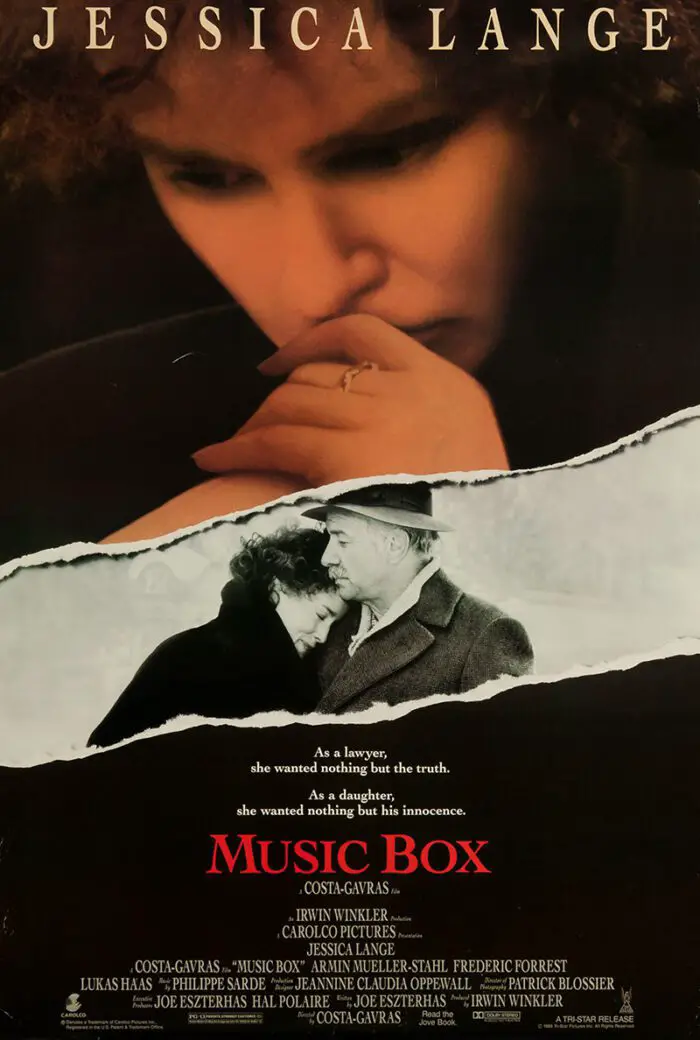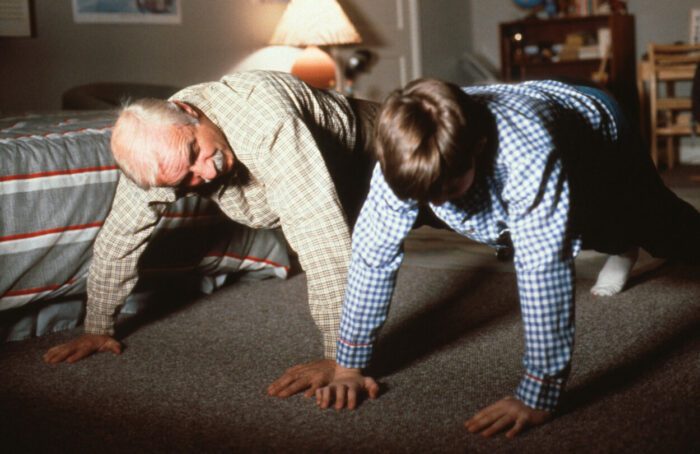Welcome to this column dedicated to my appreciation of physical media supplements called Feature Presentations. The goal of this column is not to say whether a film is good or bad and worth picking up or not- I would like to highlight the discs that go the extra mile and provide film fans with enough tasty tidbits to satisfy even the hungriest of cinephiles. Today’s article spotlights the 1989 film Music Box and is part three of a four-part review of the Film Focus: Jessica Lange 1982-1995 box set from Imprint Films.

I never have been or will claim to be an expert in reviewing the technical specs of a physical media release. There are plenty of knowledgeable people in this realm of commenting on the audio and video aspects of a disc with better setups than I’ll ever own. This column, Feature Presentations, is a way of highlighting the supplemental material within a given disc. With all that out of the way, let’s get to the good stuff and dive into my review of Music Box.
As a disclaimer of transparency for this episode of Feature Presentations, my review of the Film Focus: Jessica Lange box set and the film Music Box comes from a copy Imprint Films provided for review. All thoughts and opinions are my own.
When I hear the name Joe Eszterhas, the first films that come to mind are the complete opposite of today’s film, Music Box. I know this goes back to not seeing enough movies in my lifetime, but as a boy growing up in the early ’90s, his credits of Basic Instinct, Sliver, and Showgirls were how I knew about the infamous screenwriter. Not understanding he was capable of more than sexy-time cinema as a youngster, it took me a while to get into man’s more heady work.
And nothing screams more heady than the 1989 courtroom drama Music Box. Telling the tale of an attorney determined to defend her Hungarian-born immigrant father against war crimes allegations, we’re about as far from Showgirls as it gets. The film dives into deep personal issues of familial bonds with fathers and daughters and a throughline in the cultures between the United States and Hungary. Unfortunately, all the grand notions and deep-seeded secrets give way to a typical courtroom drama and saps what could have been a deeply personal tale into a conventional one.
You can sense that Eszterhas, a Hungarian immigrant, and director Costa-Gavras, a Greek/French filmmaker, have the best intentions. Music Box checks all the boxes of a movie wanting to touch on and tackle weighty themes, but that’s my issue with Music Box. It strives to scale these grandiose peaks of significance but doesn’t offer the needed substance that a topic of this magnitude deserves.
The supplemental material begins with a newly-recorded interview, “Life Imitates Tragedy,” featuring screenwriter Joe Eszterhas. What starts as a typical interview of Eszterhas detailing how he rose to prominence in Hollywood, his basis for the script, and his original ending turns into one of the most thought-provoking interviews on this box set. About halfway through the discussion, Eszterhas dives into his relationship with his father and how their father-son connection and deterioration mirrored many of the moments within Music Box. For a topic such as this, it’s better to experience it first-hand, but Eszterhas’ frank and open conversation needs to be heard by everyone.
“Through a Different Doorway” finds production designer Jeannine Oppewall discussing the characters and their environments. Oppewall starts with how she got into production designer work before transitioning her attention toward Music Box. She goes over various aspects of the film’s production, such as the differences in shooting in Chicago versus Budapest, using pigeons to spruce up the courtroom scenes, and the complicated nature of the titular music box. Oppewall also dedicates part of the interview to art designer László Rajk and touches upon his work outside of film during the period of the Iron Curtain. “Through a Different Doorway,” like the Eszterhas interview, admirably balances behind-the-scenes factoids and layering them with personal tales outside the film.
“Folk Dancing and Home Brew Fluency” is a newly filmed interview with actor Michael Rooker. The actor has always presented a gruff persona, but it’s a welcoming sight to see and hear the man speak as Michael Rooker the person, and explain the method to his madness. Rooker discusses his humble beginnings and how Henry: Portrait of a Serial Killer shaped how he approaches acting while also speaking in-depth about working in Budapest and the differences and similarities in cultures between Hungary and the United States. As someone who hasn’t seen much of Michael Rooker speak off camera, I found “Folk Dancing and Home Brew Fluency” a wonderful peek into Michael Rooker, the person and another standout feature on this disc.

The last of the new interviews is “Filmstruck,” a sitdown with actor Lukas Haas. Shorter than the other interviews but no less fascinating, Haas alternates the discussion between personal tales from his life and his work with Music Box. Most of the interview finds Haas reminiscing about how he came into show business early in childhood and how Witness catapulted him into the limelight. He goes in-depth on his only stage performance, featuring Steve Martin and Robin Williams, what he looks for in a character, and a Hungarian soup that he remembered from his time in Budapest. It’s an entertaining little piece and fits nicely into this package.
Imprint Films also includes the original featurette, “A Time of Trial,” conducted during the film’s theatrical run. As with most EPK pieces like this, the purpose of such a feature is to sell the movie, which it does, but those looking for anything more than surface-level details should look elsewhere. Of note are the additional, brief comments from actors Jessica Lange, Armin Mueller-Stahl, and Lukas Haas, plus director Costa-Gavras and producer Irwin Winkler. It’s a fine one-time watch, but there’s no need to revisit “A Time of Trial.”
“Profile: Taking Risks” profiles Costa-Gavras and Irwin Winkler about the production of Music Box. Culled from the earlier footage seen in “A Time of Trial,” this featurette expands moderately with Costa-Gavras explaining his thoughts on approaching a film with additional comments from Jessica Lange supporting the director’s visual eye. I appreciated seeing slightly more behind-the-scenes footage, but as with “A Time of Trial,” one viewing is plenty, and I’ll probably never revisit “Profile: Taking Risks.”
Imprint Films includes a batch of archival interviews recorded in 1989 during the press tour for Music Box. Usually, when these clips show up, they are purely puff pieces that hardly scratch the surface of interesting tidbits. To my surprise, these discussions had slightly more meat on their bones.
Two separate interviews with Jessica Lange kick off this set of extras. The first chat is the type of discussion one usually doesn’t see: a cinema star being forceful with their opinions. Jessica Lange muses about her starring role in King Kong and how The Postman Always Rings Twice was the turning point in her career, but has opinionated points on her films prior to Postman and her negative view of Everybody’s All-American and its director, Taylor Hackford. The second interview is more nuanced, but Lange offers insight into her thoughts on the character and the subject matter of Music Box.
Actor Armin Mueller-Stahl also contributes to two separate interviews, each allowing the soft-spoken actor to discuss his work on the film and his life. While it’s welcome to hear Mueller-Stahl discuss his approach to acting and throws the interviewer a quick bit of Acting 101, more interesting is when the actor discusses his personal life. Mueller-Stahl touches upon the loss of his father, growing up during World War II, and traumatic experiences during his childhood. While the discussion can veer into dark territory, Mueller-Stahl doesn’t paint a bleak picture, just his life’s journey.
The last archival interview is a chat with director Costa-Gavras. This chat is akin to a typical press junket interview, but Costa-Gavras does get into some of the production history and additional bits of his wisdom. It’s the weakest of the archival interviews, but as this is the only substantial piece on the disc with Costa-Gavras speaking his mind, it’s worth checking out.
Imprint Films includes a 2023 audio commentary with Cineaste Magazine editor Gary Crowdus, who states in the first moments of a long relationship with Costa-Gavras. Thankfully, even though Cineaste is associated with the director, Crowdus offers more insight than just a biography on the man calling “Action!”. Crowdus comes to the track prepared as he speaks almost non-stop during the run time about the film’s production, the cast and crew, and themes and motifs woven throughout Music Box. While I’m usually opposed to audio commentaries where the speaker discusses incessantly, as it can get overwhelming, Crowdus speaks in a measured tone; the information distributed does not feel rushed and allows you to absorb everything he is trying to get across.
The final bit of supplemental material is the film’s theatrical trailer.

And there you have it! While Music Box didn’t achieve in putting all of its ambitious pieces into a satisfying place, the lead performances from Jessica Lange and Armin Mueller-Stahl do their darndest to make the film a worthwhile watch. Your mileage will vary from my overall negative thoughts, but something I think everyone will be able to agree on: the supplemental material on Music Box is top-notch.




